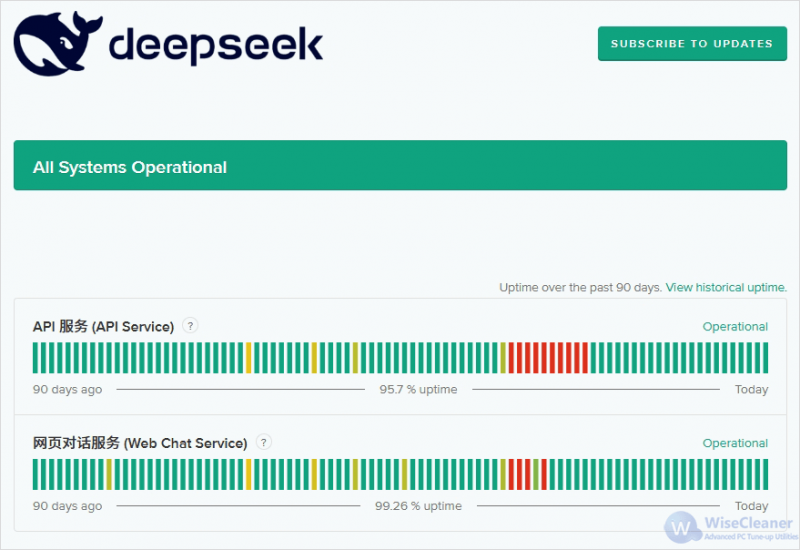DeepSeek API Down? Here's What to Do
Learn how to handle DeepSeek API downtime, including troubleshooting steps, status checking, and alternative solutions.

Importance of DeepSeek API for Businesses
Many organizations depend on the DeepSeek API for real-time operations, including customer relationship management systems, search-based applications, and content delivery networks. Any disruption to these services can lead to operational delays, misinformed decision-making, and potentially lost revenue. For companies relying extensively on API-driven processes, addressing outages proactively is critical.
Common Causes of DeepSeek API Outages
API outages often stem from various technical, network, or user-specific issues. Let’s delve into the primary causes. For a broader look at troubleshooting and performance, see DeepSeek API Troubleshooting Roadblocks or DeepSeek API Performance Metrics.
1. Technical Issues
- Server Downtime: Routine maintenance, unexpected failures, or capacity limitations can lead to disrupted services.
- Software Bugs: Poorly implemented updates or unresolved issues in the codebase may intermittently hinder API functionality.
2. Network and Connectivity Problems
External factors like internet service provider (ISP) outages, DNS problems, or local network failures can restrict access to the API, even if the service itself remains operational.
3. User-End Configuration Errors
- Misconfigured authentication credentials (e.g., invalid API keys or expired tokens).
- Errors in endpoint targeting or malformed API requests originating from client-side systems.
By identifying the root cause early, businesses can adopt precise solutions instead of resorting to time-consuming trial-and-error methods.
Immediate Steps to Take When DeepSeek API Is Down
When facing an API outage, timely action is essential to minimize disruptions. Below are the recommended steps:
Verifying the Outage
- Check Status Pages: Most providers, including DeepSeek, maintain a status dashboard to provide real-time information on service health.
- Review Error Messages: Analyze error codes and messages returned by the API for hints about the issue.
- Leverage Online Tools: Use tools like DownDetector or developer forums such as Reddit to confirm if the problem persists across users.
- Contact Support: If there's ambiguity, reaching out to DeepSeek's customer support team can clarify whether it's a system-wide outage or a user-end error.
Communicating with Your Team and Stakeholders
- Notify internal teams like DevOps, engineering, and customer service immediately to coordinate efforts.
- Keep external stakeholders and clients informed of delays due to the API outage. Transparency builds trust and prevents miscommunication during performance hiccups.
Implementing Temporary Fixes
- Leverage local data caches to minimize user disruption during API unavailability.
- Set up manual workflows as a short-term replacement for automated processes relying on API responses.
- Redirect attention to non-dependent operations that don't require live API calls.
Risk Management and Preparation for API Downtime
Being unprepared for API disruptions can lead to costly delays. A proactive risk management strategy is critical for minimizing impacts.
Creating and Maintaining Backup Strategies
- Local Data Storage: Regularly storing critical data locally ensures minimal dependency on API availability.
- Redundant Services: Introduce API proxies or failover systems to maintain functionality when the primary API becomes unavailable.
Developing a Risk Management Plan
- Conduct a business impact assessment to identify processes most affected by outages.
- Design contingency workflows that allow operations to continue with minimal efficiency loss.
Using Monitoring Tools for Proactive Action
Employ monitoring tools to detect and address issues before they escalate:
- Popular tools include Pingdom, New Relic, and Datadog, which monitor API response times and flag anomalies.
- Set up real-time alerts to notify the team immediately if thresholds are breached.
Exploring Alternatives During and After Outages
Identifying Suitable API Alternatives
During extended issues with DeepSeek API, having fallback options can sustain operations:
- Evaluate alternative APIs that perform similar functionalities and compare them based on performance, pricing, and ease of integration.
- Temporary alternatives may suffice, but consider the risks of switching mid-operation.
Considering DeepSeek Competitors
If reliability becomes a consistent issue, businesses may evaluate competing services such as:
- ElasticSearch API: Known for its robust search capabilities and flexible deployment.
- Algolia: Popular for speed and ease of use.
Assessing these competitors helps determine whether transitioning away from DeepSeek aligns with long-term objectives.
For more on endpoints and integration, check out DeepSeek API Endpoints.
Staying Informed About DeepSeek Updates
Stay updated on DeepSeek's release notes, availability, and customer feedback via:
- Forums like Reddit, where fellow users share real-time experiences.
- Monitoring official communication channels for announcements about fixes or upgrades.
Preventing Future Business Disruptions
Best Practices for API Dependency Management
- Avoid over-relying on a single API; a multi-API architecture enhances flexibility and consistency.
- Incorporate offline-capable systems that operate without live API interactions.
Maintaining Regular Communication with Service Providers
- Build strong support relationships with DeepSeek representatives, ensuring timely resolutions for advanced issues.
- Evaluate the benefits of premium support plans for faster troubleshooting during emergencies.
Optimizing Workflows for Resilience
- Design workflows that gracefully handle failures, such as retrying failed requests or auto-switching to cached data.
- Use scalable infrastructure to adapt to varying load conditions without compounding errors caused by outages.
Conclusion
API outages, while disruptive, are an inevitable part of modern development ecosystems. Understanding the root causes, proactively preparing for outages, and maintaining strong risk management practices can significantly reduce their impact on your business operations. By employing the strategies outlined here, businesses can ensure continuity, protect their reputation, and build resilience against future disruptions.